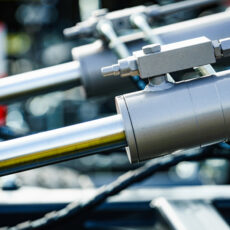 The Power Behind Your Equipment: A Guide to Hydraulic Cylinders
The Power Behind Your Equipment: A Guide to Hydraulic Cylinders
Hydraulic cylinders are incredibly powerful components commonly used to generate force, push, or pull objects in all sorts of applications. They provide the mechanical power behind various machines, from construction equipment to agricultural machinery, to industrial robotics, and so much more. In this guide, we’ll explore the basics of hydraulic cylinders, how they work, and their applications.
What are Hydraulic Cylinders?
First and foremost, hydraulic cylinders are mechanical devices that convert hydraulic force (pressure from fluid) into linear motion, force, or kinetic energy. They contain a cylindrical rod attached to a piston head that moves up and down inside a hollow cylinder to push or pull force onto an object outside the cylinder. The fluid inside the cylinder provides the necessary energy to operate the cylinder, using input pressure to produce an equal amount of output force.
How Do Hydraulic Cylinders Work?
Hydraulic cylinders work on the principle of Pascal’s Law, which states that pressure applied to fluids is transmitted equally in all directions. This law is essential to understanding how hydraulic cylinders operate since the force they generate comes from the pressure that results when hydraulic fluid is compressed or expanded.
The process begins when hydraulic fluid enters the cylinder through a port and then applies pressure to the piston head, which transfers the force to the piston rod. As the piston rod extends, it moves an external object or lifts a load, while the hydraulic fluid moves to the other side of the piston head, creating a balanced force. When retracting, the hydraulic fluid moves back to the original side of the piston head, while the rod retracts into the cylinder.
Advantages of Hydraulic Cylinders
Hydraulic cylinders offer numerous benefits over other mechanical systems. Below are some of the advantages associated with hydraulic cylinders.
1. High Power-to-Weight Ratio
Hydraulic cylinders are incredibly powerful, and they have a comparatively lower weight ratio than other mechanical systems. This makes them ideal for use in applications requiring higher force levels, like industrial robotics, construction, and transportation.
2. Reliable and Durable
Hydraulic cylinders are built to withstand extreme conditions, such as harsh weather, constant use, extreme temperatures, and heavy loads. Their robustness and durability make them a reliable component in industrial machinery, fluids handling, and high-pressure applications.
3. High Precision
Hydraulic cylinders are highly accurate, capable of functioning with remarkable precision. The ability to make complexity and precision around the cylinder results in consistent, stronger, and predictable force in the output, making the hydraulic cylinder an ideal choice for applications that require repeatable motion control.
Applications of Hydraulic Cylinders
Hydraulic cylinders have several applications, including:
1. Construction Equipment
Some construction equipment built-in hydraulic cylinders, such as bulldozers, front-end loaders, and backhoes, just to mention a few. These machines’ reliability in harsh conditions cannot be matched by any other alternative mechanical technology.
2. Transportation
Trucks and trailers, such as dump trucks, box trucks, and tow trucks, need hydraulic cylinders to lift and hold cargo during transport.
3. Agriculture
Hydraulic cylinders are used in different farming machinery, such as plows, cultivators, and sprayers. These machines need force to pull, push, and maneuver stock in the field.
4. Manufacturing
Hydraulic cylinders are commonly used in various manufacturing processing applications such as plastic molding, stamping, and packaging processing machines. They also help in positioning machinery and in large-scale assembly operations, such as vehicle or aircraft production lines.
5. Marine
Most marine vessels require hydraulic systems and cylinders to control the rudders, crane operations, elevators, and the power hydraulic systems that operate propellers.
6. Aerospace
The aerospace industry also utilizes hydraulic cylinders to operate the gears, flaps, and brakes of aircraft. These essential components require highly precise systems that can withstand harsh conditions.
Final Thoughts
Hydraulic cylinders are incredibly useful mechanical devices they convert fluid power to mechanical power, resulting in linear or rotary motion. They offer several advantages over other mechanical systems, such as high power-to-weight ratio, reliability, durability, and precision. With their broad application base, hydraulic cylinders have transformed the majority of industrial operations and equipment that require precision and high force output. If you have any queries about hydraulic cylinders or its applications for your business, don’t hesitate to consult your local hydraulic systems expert.

